
If your virtual classroom is a typical one, it will be ethnically rich and multicultural. This means that while participating in an online discussion you and your virtual classmates may use the same language to communicate with each other, but the truth is that cultural backgrounds, linguistic terminology, and abilities to express oneself in written language may vary significantly in an online learning environment. One of the great beauties of eLearning courses is that you can meet people from all parts of the world, as internet is a global medium. Moreover, try to avoid humor and sarcasm completely, as they can both easily create misunderstandings and tension. A great way to deal with this is to tone down your language avoid the use of strong words and, again, read aloud everything you want to post before you send it. If your post is still misconstrued, correct the misunderstanding right away.īecause written language lacks the support of facial or voice communication clues, it can be easily misinterpreted. Once you have ensured that your comment will indeed add a new element to the online discussion, try to explain yourself as clearly as you can. If you don’t, it is very likely that you will end up repeating things others have already said, and this, apart from contributing nothing new to the online discussion, will seem like you ignore your virtual classmates. Before replying to a question, read carefully all comments that your peers have already posted, no matter how many they are. This is why you should always think about the content of your message before contributing it. What you need to remember when participating in an online discussion is that once you send your comment, there is no way to take it back.
10 RULES OF NETIQUETTE PROFESSIONAL
Online discussions require professional writing smiley faces or linguistic shortcuts are more appropriate for chatting with your friends or instant messaging. Using emoticons and writing in “texting” language, that is by using abbreviations, might be considered too casual or even childish refrain from them as much as possible. The best way to test your messages for clarity is to read them aloud before you send them this way, you will be able to see if they make sense. Finally, never type in all caps writing in all capital letters is regarded as shouting, and this, apart from being annoying, it could be considered rude.īeing misunderstood is quite common in online interactions escape the miscommunication trap by double checking that what appears perfectly clear to you is not confusing your readers.

Moreover, try to avoid slang words as much as possible, as this is also an online education environment and slang is considered neither academic, nor professional. Typos, spelling errors, and mixed up sentences reflect on you correct spelling and grammatical construction are a must, so keep in mind to read through your posts before you submit them.

But is there an appropriate netiquette for interaction in the online environment? In this article, I'll share 10 netiquette tips for online discussions in order to help you effectively interact with your virtual classmates when writing is the only communication means that you have. Indeed, as an online learner, your goal when participating in an online discussion related to your eLearning course is the exchange of knowledge after all, you are taking eLearning courses because you want to learn.
10 RULES OF NETIQUETTE OFFLINE
Amazingly enough, this quote is still suitable, after almost a century, for all kinds of discussions, whether offline or online. “ Discussion is an exchange of knowledge argument an exchange of ignorance” once said Robert Quillen, an acclaimed journalist, who was also a discussion specialist.


 0 kommentar(er)
0 kommentar(er)
